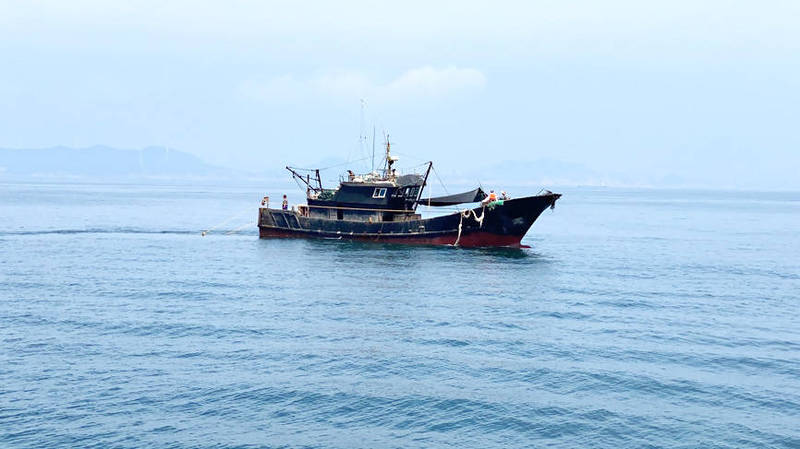《TAIPEI TIMES》 China fails to curb abuses on its fishing fleets: report

A Chinese fishing boat operates in waters near Lienchiang County on Sept. 4 last year. Photo courtesy of the Coast Guard Administration via CNA
By Shelley Shan / Staff reporter
Chinese distant-water fishing fleets have been illegally fishing in waters of developing nations, abusing migrant workers on vessels and targeting endangered marine species, the latest report published by the London-based Environmental Justice Foundation said.
“These state-subsidized vessels are ravaging the ocean, committing human rights abuses and driving environmental injustice, all while hiding behind complex onshore corporate structures preventing those responsible from being held to account. These findings highlight the overarching failure of the Chinese government to effectively control and regulate its distant-water fleet, but also reveal a wider international problem: the shocking lack of transparency across the sector,” foundation CEO Steve Trent said in a statement.
“As well as China controlling its fleet, any nation importing fish caught by Chinese vessels should be demanding full transparency along the whole supply chain. That is the only way we can be sure that we, as consumers, don’t end up eating slave-caught fish and driving the destruction of our ocean,” he added.
An investigation was conducted by cross-referencing data from the Chinese government from 2019 and 2020 with records of illegal fishing and testimonies from 116 crew members aboard 88 Chinese fishing vessels.
Ninety-five percent of the crew members told the foundation that they saw sharks thrown overboard to die after being finned on their vessels, while 34 percent of them reported that protected species such as turtles and seals were also killed.
Smartphone footage obtained by the foundation also showed seals being clubbed to death and beheaded, it said.
About one-fifth of the crew members said that dolphins were routinely slaughtered as bait for sharks, the foundation said.
“It did not matter whether the shark was big or small, even babies inside the sharks’ belly ------ we took them all. I guess you could call it a ‘devil vessel,’ because it really took everything,” one crew member told the foundation.
Beijing funded these destructive fishing practices by offering state subsidies, which have been estimated to total about US$1.8 billion, the foundation said.
Migrant workers on the vessels told the foundation that they were physically and verbally abused by Chinese captains and senior crew members, had insufficient supplies of food and water, and were forced to work grueling hours.
Eighty-five percent reported abusive working and living conditions, while 58 percent said they had witnessed or experienced physical violence, the foundation said, adding that nearly all of the crew members said they experienced some form of debt bondage, or had their passports or other documents confiscated.
The investigation also examined the Chinese fleet’s complex onshore corporate structures.
About 90 percent of Ghana’s industrial trawl fishing fleet is suspected to be owned by Chinese corporations, which use local companies to register their vessels as Ghanaian, the report said.
Many of the vessels have been repeatedly associated with illegal fishing, it added.
“Where the fish caught by the fleet ends up is also shrouded by opacity, making it difficult or impossible to trace supply chains,” the foundation said. “However, what is known is that a number of Chinese distant-water vessels are licensed to export to Europe, and China is the US’ largest seafood trading partner.”
The Chinese fleet has become a substantial presence in many developing countries and regions that have limited capacity for monitoring fishing vessels, yet are heavily dependent on fishing for local food security and livelihoods, the report said.
Africa is home to 78.5 percent of Chinese government-approved fisheries, it said.
In western Africa, the Chinese bottom trawl fishing fleet catches an estimated 2.35 million tonnes of seafood per year, valued at more than US$5 billion, or about half of China’s total distant-water catch, the report said.
新聞來源:TAIPEI TIMES















